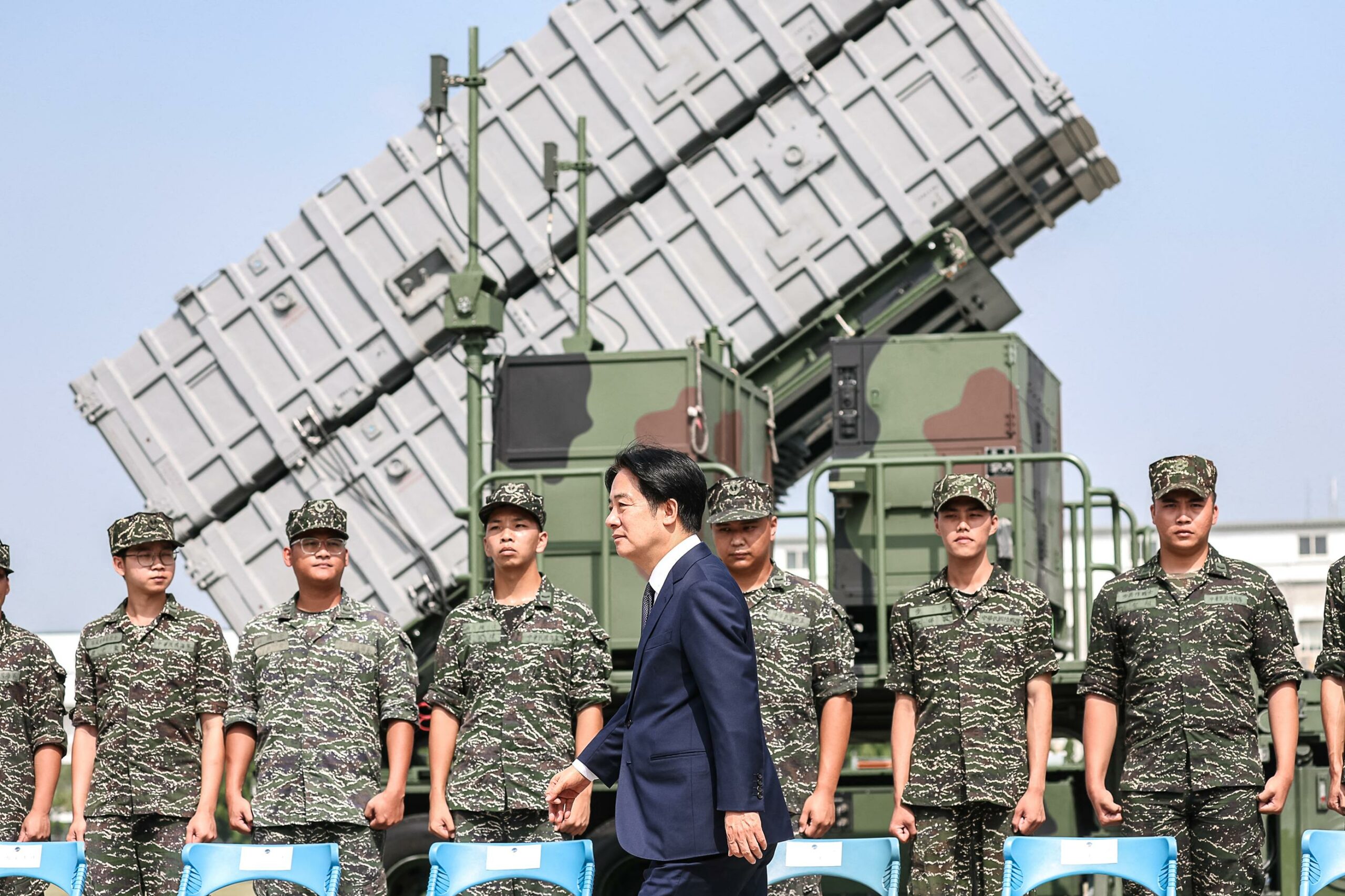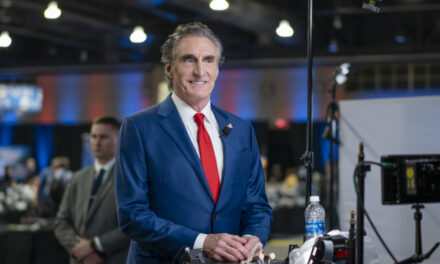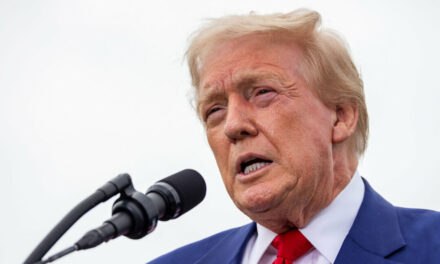We support our Publishers and Content Creators. You can view this story on their website by CLICKING HERE.
WASHINGTON—Sen. Marco Rubio (R-Fla.) and Rep. Mike Waltz (R-Fla.) are set to have a unique opportunity to leave their footprint on President-elect Donald Trump’s China policy in the next four years. Trump selected Rubio as his Secretary of State and Waltz as his national security adviser.
Trump is expected to
confront China more directly in his mandate to defend American economic and security interests, while paying personal attention to issues related to the communist regime. However, the implementation of the presidential priorities rests with senior leaders.
Both known as China hawks, Rubio and Waltz have been vocal critics of the Chinese Communist Party (CCP). Here’s what we know about their views on China.
Overall Framework
It’s easy to sound tough on China in front of the press, but the Washington consensus to deter Beijing’s aggression “needs a lot more framework,” Rubio said in his March 2023 keynote speech after The Heritage Foundation, a Washington-based conservative think tank, released a report titled “Winning the New Cold War with China.”
During his remarks, which systematically laid out his views, the senior member of the Senate Foreign Relations Committee said that the U.S.–China conflict spans geopolitical, diplomatic, societal, technological, and commercial fronts, as well as competition in military capabilities.
“And we are in a conflict with a nation-state that doesn’t just seek to replace us, that doesn’t just seek to be the most powerful nation in the world, they seek to reorient the world,” Rubio said.
The senator’s China framework—reflected in his 14-year
legislative record—includes improving human rights in China, protecting American industrial power by limiting the CCP’s access to U.S. technology, capital, and federal tax credits, and countering the CCP’s influence and espionage in the United States.
Following Rubio’s nomination as Secretary of State, his colleague on the foreign relations committee, Sen. Todd Young (R-Ind.),
said on social media platform X: “Senator Rubio possesses the acumen and judgment we need during this dangerous time.”
Sen. John Fetterman (D-Pa.), a fellow member of the Special Committee on Aging,
voiced his support for Rubio as a “strong choice.”
Waltz’s legislative record since 2018
show him taking a similar approach to China, albeit with fewer bills introduced and an additional maritime focus.
The congressman has
advocated for a maritime policy czar in the White House and a boost to U.S. shipping infrastructure. He has also
voiced concern over the downsizing of the U.S. Navy.
Waltz’s post-appointment statement offered a glimpse of his approach to the CCP threat.
“America will keep its allies close, we will not be afraid to confront our adversaries, and we will invest in the technologies that keep our country strong,” he
said in an X post on Nov. 12.
“America’s greatest strength is its booming economy and our energy dominance, and those tools will keep us out of wars and allow us to once again lead from a position of strength.”
Unlike Waltz’s national security adviser role in the White House, Rubio’s nomination needs Senate confirmation, which is expected, given the Republicans’ upcoming majority in the chamber.
In a statement the senator’s office emailed to The Epoch Times, Rubio said, “Under the leadership of President Trump, we will deliver peace through strength and always put the interests of Americans and America above all else.”
Human Rights
Rubio’s work has resulted in significant U.S. laws related to human rights abuses in China, including the CCP’s genocide of the Uyghur people in Xinjiang and the erosion of Hong Kong’s democracy and its rule of law.
After the U.S. Treasury Department
imposed human rights sanctions on Xinjiang and
Hong Kong officials in 2021, Rubio was targeted by Beijing twice with retaliatory sanctions. If Beijing doesn’t remove Rubio from its list, he will be the first sitting U.S. Secretary of State sanctioned by the CCP.
This fact “in and of itself is a pretty tough message to China,” according to Victoria Coates, former deputy national security adviser during the first Trump administration and current vice president at The Heritage Foundation.
Coates said the nomination of Rubio as top diplomat and the appointment of Waltz show the president-elect “is very serious about confronting the CCP and their malign behavior,” and the second Trump administration will probably be “more aggressive against China than they were in the first term.”
In June, Rubio introduced new bills to reauthorize the
Hong Kong Human Rights and Democracy Act of 2019 and the
Uyghur Human Rights Policy Act of 2020, under which sanctions on Chinese officials responsible for human rights abuses expire in 2024 and 2025, respectively.
Aside from the Uygher population, the senator doesn’t shy away from the issue of Falun Gong—a spiritual practice based on the tenets of truthfulness, compassion, and tolerance—which the CCP has persecuted for more than two decades. Falun Gong was practiced by more than 70 million people in China in 1999, according to official estimates, causing the regime to perceive its popularity as an existential threat.
Beijing’s sweeping persecution has transcended its borders, going so far as to
target Falun Gong practitioners in the United States and elsewhere.
In July, Rubio
introduced the Falun Gong Protection Act in the Senate, which targets those responsible for China’s state-sanctioned harvesting of organs from prisoners of conscience. The House
passed a companion version earlier in June.
An independent people’s tribunal
found in 2019 that the Chinese regime had been killing detained Falun Gong practitioners for their organs on a “significant scale.”
Besides bills that sanction human rights perpetrators, Rubio also led in the
passage of the Uyghur Forced Labor Prevention Act that became law in December 2021 and bans all imported goods from Xinjiang unless it can be proven that they were not produced using forced labor.
(Top) A worker picks cotton in the fields in Shihezi, Xinjiang Province, China. (Bottom) Demonstrators take part in a protest against the Chinese Communist Party’s new national security law in Hong Kong on July 1, 2020. Guang Niu/Getty Images, Anthony Kwan/Getty Images
Waltz, a member of the House Foreign Affairs Committee, is also an outspoken critic of China’s human rights record.
In 2021, he
called for the boycott of the 2022 Winter Olympics in Beijing, equating it to the 1936 Olympics in Nazi Germany. He introduced bills seeking to
ban business partners of the Beijing Games from winning U.S. government contracts for four years and to
strip the International Olympic Committee of its tax-exempt status.
In March 2022, Waltz co-wrote a
letter criticizing the National Basketball Association (NBA) a month after player Enes Kanter Freedom was
dropped from his team following Freedom’s public condemnation of the CCP’s human rights abuses.
After Freedom’s ouster, the NBA denied involvement in the decision, telling media outlets, “We continue to support Enes Kanter Freedom expressing his views on matters that are important to him as we do for all members of the NBA family.”
Securing the US Supply Chain
Over the years, Rubio has grown increasingly of the CCP’s industrial ambitions and has worked to shore up American industrial power to ensure the United States maintains its advantage over China.
In a
report his office published in September, the senator wrote that China “now leads in many of the industries that will determine geopolitical supremacy in the 21st century, from shipbuilding to electric vehicles,” because of the regime’s control of the world’s largest industrial base and its “market-distorting subsidies and rampant theft.”
“This means Beijing will have greater sway over which set of values defines the 21st century: liberty and representative government, or authoritarianism and oppression,” he added, calling for a “whole-of-society” response.
An example of Rubio’s approach to China is the action he took against Ford’s $3.5 billion electric vehicle battery plant in Michigan in partnership with China’s Contemporary Amperex Technology Co., Ltd. (CATL), the world’s largest battery maker.
The senator was among the first lawmakers to
sound the alarm about CATL, writing to the secretaries of the Treasury, Energy, and Transportation departments after the partnership was announced in February 2023.
He questioned the departments about whether CATL had obtained U.S. technology illicitly, the company’s potential ties to the Chinese military, and any involvement it may have had with forced labor. He also
introduced legislation to
ensure the Ford–CATL deal would not receive federal tax incentives under the Inflation Reduction Act.
Due to pressure from the senator and other lawmakers, as well as the House Select Committee on the CCP and a grassroots
campaign launched by concerned locals, Ford suspended the project six months later.
Rubio later
told The Epoch Times that CATL “shouldn’t be allowed to operate in the U.S. or benefit from American taxpayer subsidies” because they are “not just economic competitors but tools of the Chinese Communist Party.”
Nick Iacovella, senior vice president at the Coalition for a Prosperous America (CPA), an advocacy organization exclusively representing manufacturers that have production facilities in the United States, has worked with the senator and his office for years.
He called Rubio “one of the greatest foreign policy minds of our time.”
“His foreign policy expertise—combined with a deep understanding of economic, industrial, and trade issues—make him uniquely qualified to be the next Secretary of State,” Iacovella told The Epoch Times.
“Senator Rubio has led Congress in addressing China’s attempts to undermine U.S. economic and national security … His notable domestic policy accomplishments and advocacy for industrial policy will make him a powerful champion for a prosperous future for American manufacturers, workers, and families.”
Waltz’s efforts on U.S. supply chain independence has centered on critical minerals, a vital component of the defense industry.
As a member of the House Armed Services Committee, Waltz
introduced a bill to boost domestic research and production of critical minerals after disruptions of global supply chains during the COVID-19 pandemic highlighted countries’ over-dependence on China, which had
provided around 80 percent of the world’s rare earth minerals until a few years ago. Provisions of the legislation became law as part of an omnibus spending
bill in 2020.
Workers use excavators during an exploration for nickel ore, a critical component used in electric vehicle batteries, on Wawonii Island in southeast Sulawesi, Indonesia. Adek Berry/AFP via Getty Images
The congressman also introduced
legislation banning CCP-controlled companies from mining minerals or petroleum in the United States.
He
opposed the Biden administration’s climate-related energy transition, saying the mandate to reach zero carbon dioxide emissions at military installations by 2030 would harm the U.S. Army’s readiness, while China controls most of the critical minerals needed for batteries.
The Epoch Times has reached out to the U.S. Army for comment.
Countering CCP Espionage
As the vice chair of the Senate Select Intelligence Committee, Rubio has also been instrumental in enacting the Intelligence Authorization Act each year. The act authorizes funding for the intelligence community to combat the espionage activities of foreign adversaries, including China.
Separately, to prevent the CCP from accessing U.S. critical infrastructure, Rubio introduced the
SPACE Act in May 2023, seeking to ban Chinese telecommunications and aerospace goods and services from the supply chains of the Commerce Department and NASA and restrict foreign entities’ ability to acquire U.S. space companies. The legislation became
law as a part of the annual defense bill at the end of last year.
The CCP’s infiltration into U.S. telecommunications networks became a
focal point during the presidential election when the phones of candidate Trump and his running mate, Sen. JD Vance (R-Ohio), were
hacked by Chinese entities.
To protect research from Chinese espionage, Waltz
introduced legislation in 2021 to ban federal funds from being awarded to researchers participating in China’s Thousand Talents Program.
He also
opposed the Justice Department’s decision in 2022 to end the China Initiative, a program designed to prioritize identifying and prosecuting individuals engaged in the CCP’s economic espionage activities.
A U.S. Air Force U-2 pilot looks down at a suspected Chinese surveillance balloon as it hovers over the United States on Feb. 3, 2023. U.S. Department of Defense via Getty Images
Indo–Pacific
Both Rubio and Waltz are staunch advocates for credible U.S. deterrence in the Indo–Pacific to counter the Chinese regime’s expansion in the region.
The senator’s provision of fast-tracking arms sales to Taiwan was
included in the 2023 National Defense Authorization Act (NDAA). In May 2023, he also introduced a bill
requiring the Department of Defense to preemptively strengthen aircraft assets in the event of the CCP’s forceful takeover of Taiwan. The bill passed in the Senate but didn’t become part of the NDAA for fiscal year 2024.
In recent years, he has consistently
introduced more bills to bolster U.S. support for the democratic self-ruled island as the CCP ramped up its economic and military aggression.
Following Rubio’s nomination, Taiwan’s President Lai Ching-te congratulated the senator on
X, thanking him for his “staunch support for Taiwan & tireless efforts to defend freedom & human rights globally.”
Waltz, a former defense policy director for Defense Department secretaries under President George W. Bush, takes a special interest in the Indo–Pacific region and has spent years building the U.S.–India partnership as a lawmaker.
During a House Armed Services Committee hearing in April 2023, Waltz
pressed the senior Pentagon Indo–Pacific leaders on securing the support of allies in the region and acting quickly in a Taiwan contingency.
In 2021, when Waltz was vice co-chair of the House India Caucus, he
called on the United States to formalize an alliance with India to gain “an edge over China.” In 2023, Waltz and Rep. Ro Khanna (D-Calif.), co-chairs of the Indian Caucus, along with other caucus members,
introduced legislation to fast-track U.S. weapon sales to India.
In a statement to The Epoch Times, Khanna said Waltz has been “a strong leader” in building U.S.–India relations.
“I am confident that he will work to strengthen the U.S.–India defense partnership and deter aggression from China,” he said.
Sen. Ted Cruz (R-Texas), Rubio’s colleague on the Foreign Relations Committee, said Rubio would be “a very effective diplomat for America.”
“Marco is smart. He cares about foreign policy. He cares about standing up to communists, especially in Cuba,” Cruz said in his podcast “Verdict with Ted Cruz” on Nov. 13.
“He cares about standing up to communists in China.”
Taiwan President Lai Ching-te walks past soldiers at a naval base following Chinese military drills in Taoyuan on Oct. 18, 2024. I-Hwa Cheng/AFP via Getty Images


 Conservative
Conservative  Search
Search Trending
Trending Current News
Current News 







